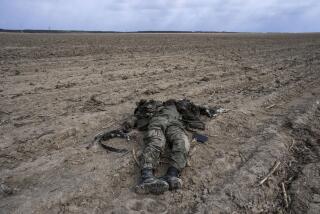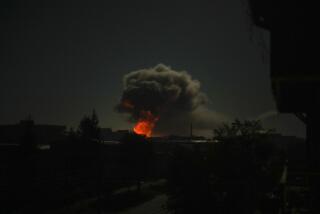Chernobyl Death Toll Climbs to 23, Gale Says
- Share via
MOSCOW — The U.S. surgeon treating victims of the Chernobyl nuclear disaster today increased the death toll to 23 people and said 59 others are in serious condition with severe radiation exposure.
In Cologne, West Germany, Soviet Deputy Health Minister Yevgeny Chazov said the death toll has risen to 21 in the accident, but the American doctor, Robert Gale, said, “Those figures are incorrect.”
The previous Soviet figure was 19. Chazov said the 21 dead included 11 who had bone marrow transplants. He also said 210 people still are hospitalized and 30 are in a serious condition.
Gale, the Los Angeles-based bone marrow transplant expert invited to the Soviet Union to treat the disaster’s victims, also said he has received permission from Soviet authorities to travel to Chernobyl, 600 miles southwest of Moscow, for an “on-site inspection.”
Radiation Deaths
Gale said in a telephone interview that besides the two people killed during the initial April 26 explosion at the power plant, 21 have died in Moscow hospitals of radiation sickness and related diseases.
He said 59 people now are considered in serious condition with 14 of those exceptionally critical.
“The figures I have told you are the latest and they are reliable,” Gale said.
Gale said that in the first 24 hours after the accident Soviet medical teams examined 1,000 people at Chernobyl and selected 300 people they thought to have at least some degree of radiation exposure for evacuation to at least three Moscow hospitals.
Restarting Reactors
Meanwhile, Radio Moscow said today that Soviet authorities plan to restart the three remaining nuclear reactors at Chernobyl by the end of the year, including the sister reactor of the damaged fourth unit.
The radio report said cleanup activities at the power complex 600 miles southwest of Moscow are being conducted at a rapid pace and three of the four reactors will be back on line by the end of the year.
“Engineers and technicians permanently keep an eye on the reactors, which are to be recommissioned already this year,” the report said.
Soviet scientists have said the three reactors are in “operational reserve” after being turned off immediately following the accident that sent a cloud of radioactive debris spreading across Europe.
The area immediately adjacent to the damaged unit remains a “no-go” area for humans.
More to Read
Sign up for Essential California
The most important California stories and recommendations in your inbox every morning.
You may occasionally receive promotional content from the Los Angeles Times.












